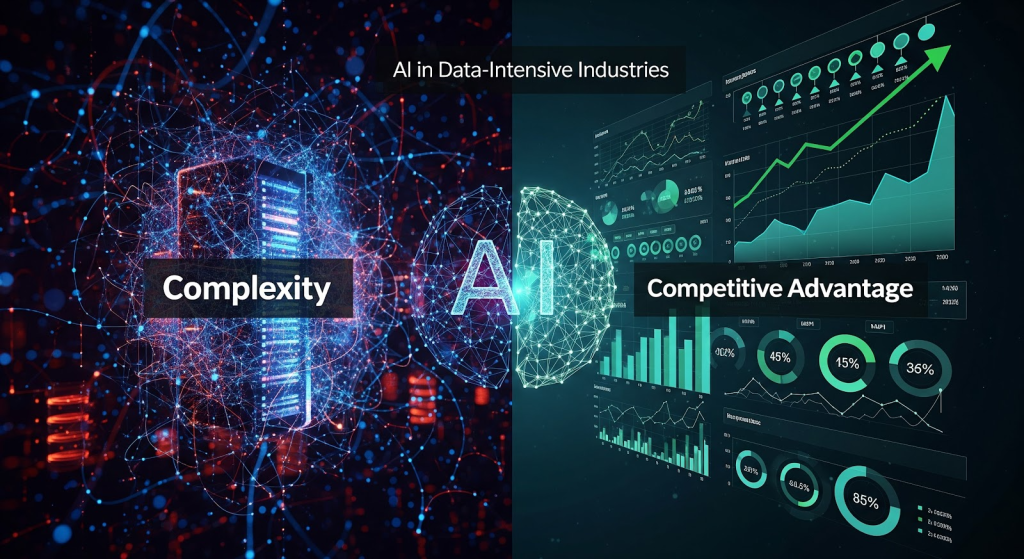Modern industries don’t just produce data; they produce a vast amount of it.. From patient records and imaging scans in healthcare, to transaction logs in fintech, to shipment tracking across global supply chains, the volume of information is staggering. But sheer data volume isn’t the problem – complexity is.
Traditional analytics and business intelligence tools can only scratch the surface. They report what happened yesterday, but they struggle to keep pace with the speed, variety, and unpredictability of modern data. This is where AI-powered data analytics is no longer optional, it’s becoming the defining advantage for enterprises that must operate in real time.

Why AI Matters for Data-Intensive Industries
AI transforms complexity into clarity, offering more than just efficiency. Modern AI models can detect patterns that humans would miss, automate repetitive analysis, and even prescribe the best course of action. Instead of waiting weeks for a report, leaders can make decisions within minutes, armed with deeper insights.
This shift is especially critical in industries where decisions impact not just profit margins, but people’s lives and trust.
Healthcare: Smarter Care with Data-Driven Insights
Healthcare systems are drowning in information, from electronic health records and medical imaging to genomics and wearable devices. For clinicians, the challenge is not access to data, but making sense of it fast enough to improve patient care.
AI is helping solve this by:
- Predicting which patients are at higher risk of readmission.
- Assisting doctors with evidence-based treatment recommendations.
- Accelerating drug discovery by analysing molecular structures at scale.
The result? Faster diagnoses, more personalized treatments, and better patient outcomes. AI doesn’t replace doctors—it augments their ability to deliver timely and accurate care.
Fintech: Building Trust Through Intelligent Systems
In finance, trust is currency. With millions of transactions happening every second, the risk of fraud, credit defaults, or compliance failures is ever-present. Traditional methods of monitoring struggle to keep up with the velocity and variety of data.
AI provides a new layer of defense and innovation. It can identify fraud in real time by flagging unusual patterns, assess creditworthiness by analyzing non-traditional datasets, and even power personalized customer experiences such as AI-driven financial recommendations.
For fintech companies, AI doesn’t just reduce risk, it builds customer trust and creates space for smarter, safer innovation.
Supply Chain: From Fragile to Resilient
Global supply chains have become more unpredictable than ever. Disruptions in logistics, fluctuating demand, and unforeseen geopolitical risks create constant challenges. Traditional forecasting models often break down under this complexity.
AI enables supply chains to become proactive instead of reactive. It powers predictive maintenance to reduce equipment downtime, demand forecasting to optimize inventory, and route optimization to ensure timely, cost-effective deliveries.
The advantage is not just efficiency—it’s resilience. Enterprises that leverage AI in supply chains can absorb shocks and adapt faster than competitors still relying on static models.
Challenges That Cannot Be Ignored
While the potential is clear, enterprises adopting AI face hurdles. Data quality remains a perennial issue, flawed input leads to flawed output. Scalability is another challenge, requiring robust infrastructure to handle enterprise-level workloads. And leaders increasingly demand explainability: AI insights must be transparent and trustworthy, not black-box predictions.
Overcoming these challenges is not just a technical task—it requires strategic governance, cultural readiness, and continuous monitoring.
Turning Complexity into a Strategic Edge
AI is no longer an experimental add-on. For industries where complexity and scale are daily realities, it is becoming the foundation of competitive advantage. Organizations that embrace AI-powered data analytics can move faster, adapt quicker, and deliver greater value—while those that hesitate risk falling behind in a world that won’t slow down.
Conclusion
Healthcare, fintech, and supply chain industries show us a clear truth: the rise of AI in data-intensive environments is not about replacing human expertise but amplifying it with intelligence at scale. Complexity, once a burden, can now become a strategic edge.
